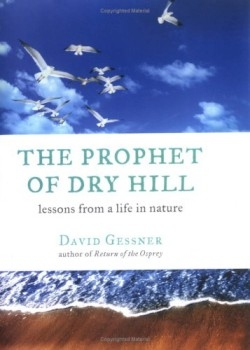The Prophet of Dry Hill
Lessons from a Life in Nature
The author had resided on Cape Cod for years in admiration of the famous nature writer John Hay, who lived up the hill from him. Despite Gessner’s previous publications—<I<Sick of Nature and Return of the Osprey, among other books, and his teaching at the University of North Carolina—he stood in awe of Hay, whose nature writing was legendary.
One day, the legend called Gessner to compliment him on an article criticizing the local development of oversized houses. They took a walk together on their wind-swept point, and the two—the established environmental guru and the up-and-coming nature writer—developed a camaraderie that both encompassed and transcended the bonds of New England neighborliness and the collegiality of shared vocation.
Their bond is grounded in their mutual appreciation for living life in relationship to wilderness. They understand the effect that awareness of nature can have on the spirits of those who pay attention. Gessner describes how, on one excursion, Hay “waved his cane over the water and then turned back toward the scruffy landscape of the dune. ‘Scientists give names to things,’ he said, ‘… but what they never quite get at is the sense that the whole landscape is in movement. Things are always interacting and moving.’ He smiled and leaned his head back in the sun.”
Hay reminisces about other writers he has known, especially the Pulitzer Prize-winning poet Conrad Aiken. Coming to Cape Cod originally to stay with Aiken, Hay was “hoping to absorb whatever it was that made Aiken a writer.” As he soaked up lessons on living a literary life (in long, poetical, philosophical conversations over cocktails), Hay’s bones and soul soaked up the saltwater-spiked breezes of Cape Cod, and he stayed for sixty years, publishing works like The Run and The Bird of Light.
Gessner, by contrast, “wasn’t searching for a mentor exactly; I was too old for that—already thirty-nine and beyond the age of apprenticeship. But during our first meeting I sensed that being with him might steady me in the unconventional choices I’d made.”
As their friendship progresses in time and closeness, it becomes clear that Hay is approaching the end of his life; the two explore how close awareness of nature can ease the acceptance of death. “‘Do you believe in traditional religion?’ I had asked. ‘Nature is my religion,’ he said, almost brusquely. Then, more quietly: ‘The ceremony of nature.’”
Despite occasional lapses into a plaintive tone, Gessner has written a lyrical, meditative volume on the lessons to be learned from listening—to the land, and to those who have lived long, mindful lives. He concludes, “If we look for it, we will find that a whole world is waiting for us. And it is in that world that we, not seeking it, will find a sort of salvation.”
Reviewed by
Karen McCarthy
Disclosure: This article is not an endorsement, but a review. The publisher of this book provided free copies of the book to have their book reviewed by a professional reviewer. No fee was paid by the publisher for this review. Foreword Reviews only recommends books that we love. Foreword Magazine, Inc. is disclosing this in accordance with the Federal Trade Commission’s 16 CFR, Part 255.

